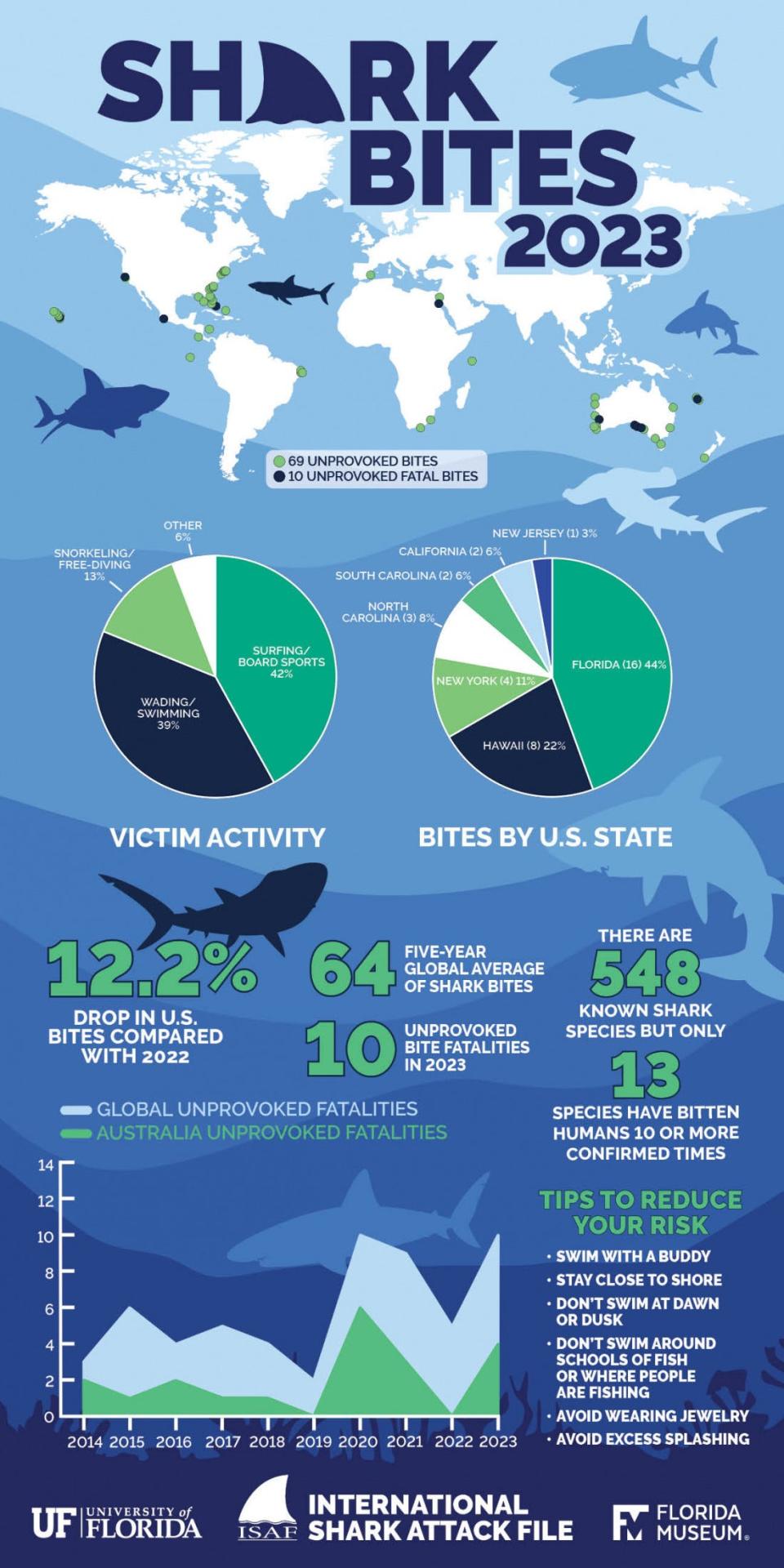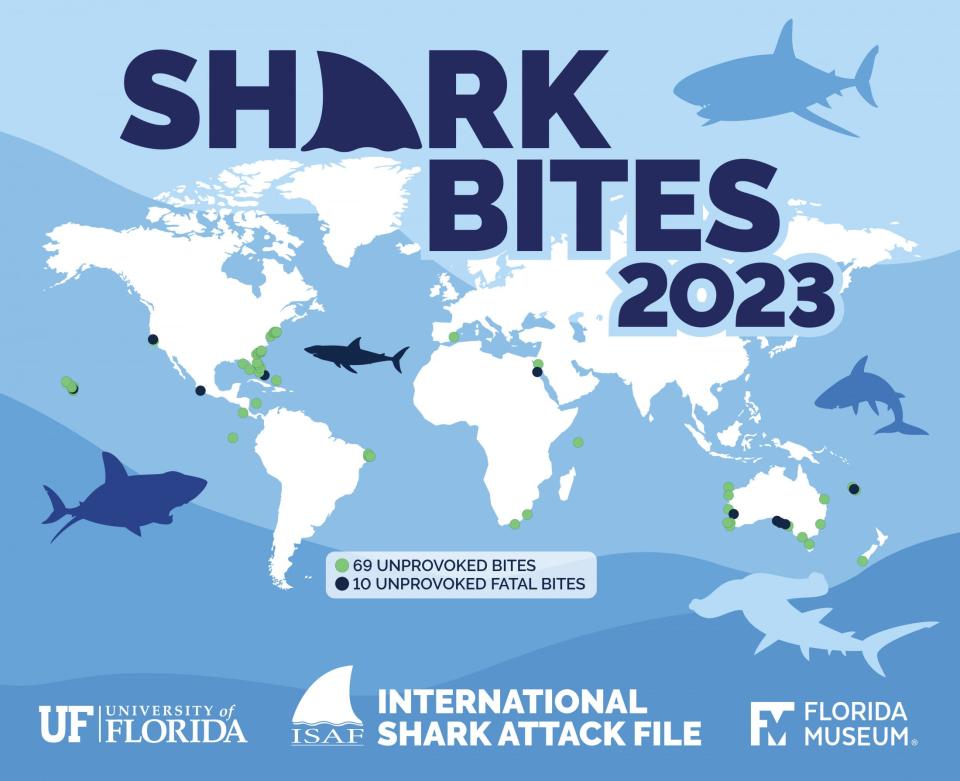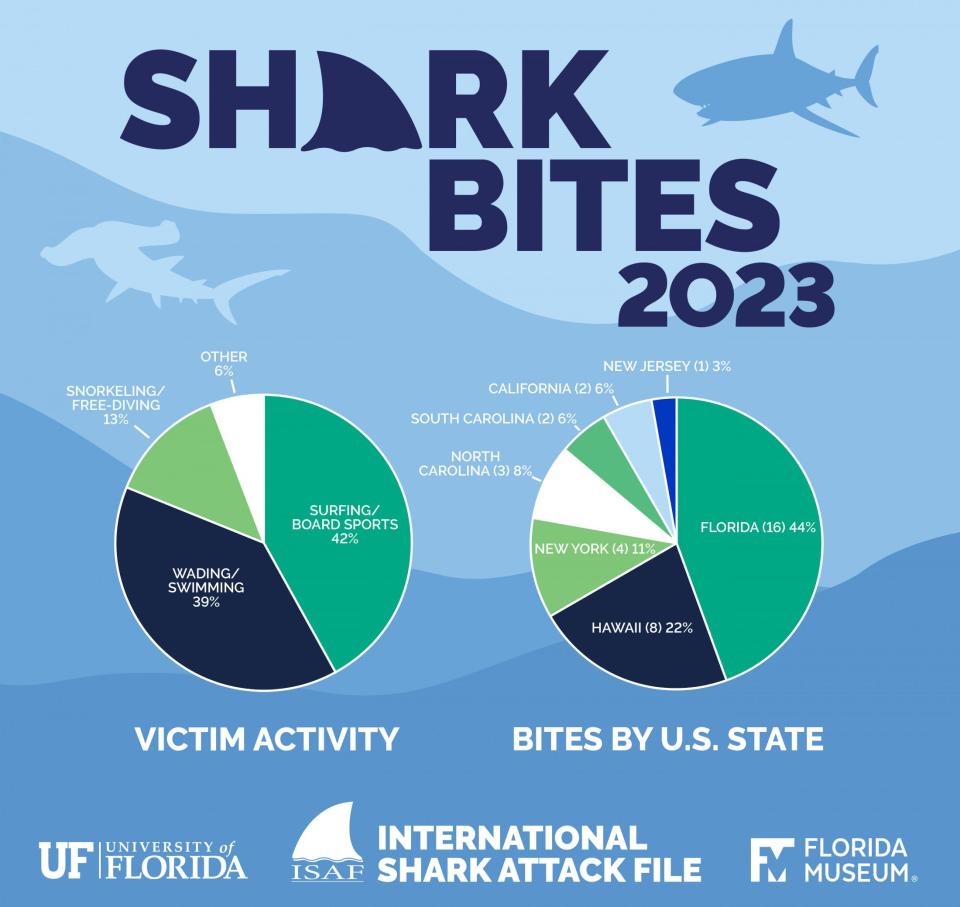Shark attacks in 2023: Which statistic did a researcher find 'a bit unnerving?'
The University of Florida’s International Shark Attack File (ISAF) 2023 shark bite report was released Monday morning.
ISAF, a scientific database of global shark attacks, documents and investigates all bites on humans by sharks. However, the annual report focuses primarily on unprovoked attacks, which are defined in a press release as “any instance in which a shark is in its natural habitat and attacks without any human provocation, which includes intentionally approaching a shark or swimming in an area where bait is being used to lure fish.”

The report shows that 2023 had an increase in the number of unprovoked attacks worldwide as well as an increase in fatalities compared to the year prior. ISAF reports confirmed 69 unprovoked bites in 2023, which is higher than the most recent five-year average — 63 attacks — but consistent with long-term trends.
Fatalities made up 10 of the past year’s unprovoked attacks — an increase from five the year prior. A disproportionate number of these occurred in Australia, which accounted for 22% of all attacks and 40% of fatalities.
“This is within the range of the normal number of bites, though the fatalities are a bit unnerving this year,” said Gavin Naylor, director of the Florida Museum of Natural History’s shark research program, in a press release.
The release says unprovoked bites are the most useful for studying how sharks behave.
Where were the attacks?
“Beach safety in Australia is second to none. They're fantastic,” said Joe Miguez, a doctoral student in the Florida Program for Shark Research, in a press release. “However, if you go to remote regions where beach safety isn’t in place, there is a higher risk of a fatal shark attack. This is because when an attack happens and there is beach safety, you can get a tourniquet on sooner and save the person's life. So, the solution isn’t to not surf. It’s to surf in areas where there's a good beach safety program in place.”
Three fatalities in 2023 occurred at one specific surfing destination off the coast of Southern Australia in a remote area: the Eyre Peninsula, which is a popular spot for surfers despite being difficult to access and navigate. The region has seal colonies and a high density of white sharks, which means problems for unsuspecting surfers — who experienced 42% of bites worldwide, with swimmers and waders at 39%.
“If a white shark is going after a seal and the seal knows it, the white shark hasn’t got a chance,” said Naylor in a press release. “Seals are really agile, so the only ones that get caught are the ones that are goofing off and flopping around on the surface minding their own business. And that’s kind of what a surfer looks like.”
Australia also has bull sharks in and around its estuarine rivers, and one fatality from a bull shark attack occurred in early 2023 in a brackish river near the coast.

There were two deaths in the U.S. and one each in the Bahamas, Egypt, Mexico and New Caledonia. Non-fatal bites occurred in Costa Rica, Colombia, Brazil, New Zealand, Seychelles, Turks and Caicos, Ecuador (in The Galápagos Islands) and South Africa.
Attacks in the United States accounted for 52% of incidents worldwide with 36 unprovoked attacks. Two were fatal: One in California and another in Hawaii.
Consistent with patterns from previous years, Florida had more shark bites than any other state with 16 attacks.
An additional 22 attacks last year that were intentionally or unintentionally provoked were included in ISAF’s records. Reports show the most common activity of the victim at the time of provoked attacks was spearfishing.
What type of sharks?
Although the majority of unprovoked attacks are “test bites” — when a shark misidentifies a human as preferred prey and typically swims away after a single bite — larger species such as white sharks and tiger sharks can be fatal with just a single bite.
Some unusual incidents of sharks continuing to bite their victim instead of swimming away have been documented among tiger sharks, bull sharks and white sharks, a press release said. These species, commonly referred to as the "Big Three," are capable of causing serious injury with teeth meant to shear instead of hold and are commonly found in areas where humans are in the water.
The list of species associated with attacks are skewed toward readily and easily identified species, ISAF warns.
Temperature and population density have an effect
This month marks the 50th anniversary of the book "Jaws," and the number of recorded white shark bites has increased over a few decades. However, this is not because of increased aggression from the sharks; rather, it’s a combination of more people in the ocean each year and an increased emphasis on reporting bites and fatalities.
An increase of human activity in a shark’s habitat increases the number of encounters we will have with the animal. Shark bites usually occur during summers in the Northern and Southern Hemispheres because many species are more active at that time and more people spend time in the water.

A press release states that despite the increased numbers, the number of bites and fatalities in 2023 are within the average for the last decade. There are consistently fewer than 100 unprovoked bites each year.
ISAF said in the release that while the odds of being bitten by a shark are extremely low — actually, you’re more likely to win the lottery — they recommend staying close to shore, avoiding excessive splashing, and not swimming at dusk or dawn as further precautions.
Information to report a shark attack is available at https://www.floridamuseum.ufl.edu/shark-attacks/report-attack/.
This article originally appeared on The Gainesville Sun: 2023: How many unprovoked shark attacks? How many people died?

